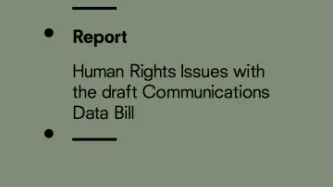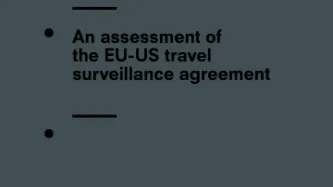Advanced Search
Content Type: News & Analysis
Jaafar Al Hasabi, Mohammed Moosa Abd-Ali Ali, and Saeed Al-Shehabi each fled Bahrain for the United Kingdom with one goal: to be safe.
These men, activists in the pro-democracy movement in Bahrain, were variously subject to torture, arbitrary detention, harassment, and psychological trauma in their home country. They thought coming to the UK, and living in exile, would at least mean they would be outside the reach of the Bahraini government.
Despite the nearly 4,000 miles between their homes…
Content Type: Advocacy
What do Egypt, Kenya, Turkey, Guinea, and Sweden have in common? Despite having a Constitutional right to privacy, they are adopting and enforcing policies that directly challenge this human right.
These states are also up for a Universal Periodic Review this year before the United Nations Human Rights Council. UPRs are a mechanism within the Council aimed at improving the human rights situation in all countries and address human rights violations wherever they occur.
Despite having…
Content Type: News & Analysis
3 June 2014
The following article written by Carly Nyst, Privacy International's Legal Director, originially appeared on the Future Tense blog on Slate:
The news that the CIA is no longer using vaccination programs as a front for spying operations may come as a relief to many humanitarian workers. Yet their fears should not be completely assuaged, because the CIA’s activities—which undoubtedly threatened the safety of humanitarian workers and those they seek to help—pale in…
Content Type: Press release
Privacy International today filed a legal complaint demanding an end to the unlawful hacking being carried out by GCHQ which, in partnership with the NSA, is infecting potentially millions of computer and mobile devices around the world with malicious software that gives them the ability to sweep up reams of content, switch on users' microphones or cameras, listen to their phone calls and track their locations.
The complaint, filed in the UK’s Investigatory Powers Tribunal, is the…
Content Type: News & Analysis
After two years of pressing the Government to come clean on what, if anything, they are doing to investigate the potentially illegal export of the spyware FinFisher, a ruling today by the Administrative Court in Privacy International’s favour marks a significant turning point in our long-running campaign to bring more transparency and accountability to the surveillance industry.
The High Court slammed Her Majesty’s Revenue and Customs for not disclosing whether it was investigating…
Content Type: Press release
High Court slams HMRC for unlawful concealing of information surrounding export of spyware FinFisher
In a damning judgment today the Administrative Court declared that Her Majesty’s Revenue and Customs (HMRC) acted unlawfully and “irrationally” in issuing blanket refusals into the status of any investigation into the potentially illegal export of the spyware FinFisher to repressive regimes by UK-based Gamma International.
The case arises from Privacy International’s long-running campaign to bring transparency and accountability to the secretive surveillance technology industry. As…
Content Type: News & Analysis
UPDATE: The Kosovar minister of European integration – Vlora Citaku – announced in a tweet on April 29th that the government has approved the law on the interception of telecommunications. The draft law will now be reviewed by the parliament.
_____________________________________________________________
The government of Kosovo is currently preparing a new surveillance law that will turn Kosovar network operators and service providers into de facto agents of the Kosovo…
Content Type: Press release
After challenging HMRC's blanket refusal to release information about the potentially unlawful export of Gamma International's FinFisher surveillance technology, the court has said that the case should proceed to trial and the grounds of Privacy International's challenge are of public importance.
Privacy International in February filed for judicial review of a decision of HMRC, the body responsible for enforcing export regulations, claiming the department is acting unlawfully in its refusal to…
Content Type: News & Analysis
Privacy International's partner organisation, Bytes for All, has filed a complaint against the Government, decrying the human rights violations inherent in such extensive surveillance and demonstrating how the UK's mass surveillance operations and its policies have a disproportionate impact on those who live outside the country.
Bytes for All, a Pakistan-based human rights organization, filed its complaint in the UK Investigatory Powers Tribunal (IPT), the same venue in which Privacy…
Content Type: Press release
A complaint filed with the Organisation for Economic Cooperation and Development (OECD) against Trovicor GmbH, a German company accused of selling surveillance technology to Bahrain, has been rejected on almost every count, the German National Contact Point (NCP) for the OECD announced.
In February 2013, Reporters Without Borders (RSF), the European Center for Constitutional and Human Rights (ECCHR), Privacy International, the Bahrain Center for Human Rights and Bahrain Watch filed a…
Content Type: Press release
Privacy International today has filed a complaint with the Australian Inspector-General of Intelligence Security, calling for an immediate investigation into deeply troubling reports that the Australian intelligence services offered to violate the privacy rights of millions of citizens by handing over bulk metadata to its Five Eye partners.
According to the leaked Five Eyes memo published in the Guardian on 2 December, the Australian Signals Directorate, during a meeting…
Content Type: News & Analysis
The following is an excerpt from a Comment originally publihsed by The Guardian, written by Privacy International's Head of Research, Eric King:
As the global public reels from yet another Snowden revelation – this time, that the US and UK intelligence forces have hacked into and planted spyware on more than 50,000 computer networks worldwide – the hypocrisy of the US and British governments is brought into sharp relief. Less than four years ago Hillary Clinton, chastising China, declared that…
Content Type: News & Analysis
Privacy International today is proud to announce our new project, Aiding Privacy, which aims to promote the right to privacy and data protection in the development and humanitarian fields. Below is an outline of the issues addressed in our new report released today, Aiding Surveillance.
New technologies hold great potential for the developing world. The problem, however, is that there has been a systematic failure to critically contemplate the potential ill effects of deploying technologies in…
Content Type: Press release
Privacy International today has filed formal complaints with the Organisation for Economic Cooperation and Development (OECD) in the UK against some of the world’s leading telecommunication companies, for providing assistance to British spy agency GCHQ in the mass interception of internet and telephone traffic passing through undersea fibre optic cables.
According to recent reports, BT, Verizon Enterprise, Vodafone Cable, Viatel, Level 3, and Interoute granted access to their fibre optic…
Content Type: Press release
Privacy International welcomes the resolution introduced on Friday by Germany and Brazil to the UN General Assembly, affirming the international human right to privacy and its essential nature to the realization of other rights, and condemning mass State surveillance of individuals around the world.
Should the resolution be adopted, it will be the first major statement by a UN body on privacy in 25 years, since General Comment 16 in 1988 by the Human Rights Committee. It is also the first…
Content Type: Press release
General Assembly Should Pass Strong Resolution on the Right to Privacy in the Digital Age
(New York, November 21, 2013) – The United Nations General Assembly should approve a new resolution and make clear that indiscriminate surveillance is never consistent with the right to privacy, five human rights organizations said in a November 21, 2013 letter to members of the United Nations General Assembly.
After heated negotiations, the draft resolution on digital…
Content Type: Report
New technologies may hold great benefits for the developing world, but without strong legal frameworks ensuring that rights are adequately protected, they pose serious threats to populations they are supposed to empower.
This is never more evident than with the rapid and widespread implementation of biometric technology. Whilst concerns and challenges are seen in both developed and developing countries when it comes to biometrics, for the latter they are more acute due the absence of laws or…
Content Type: Press release
Civil society organisations today called upon the members of the Human Rights Council to assess whether national surveillance laws and activities are in line with their international human rights obligations.
The Snowden revelations have confirmed that governments worldwide continue to expand their spying capabilities, at home and abroad. Widespread surveillance is being conducted in violation of individuals’ rights to privacy and free expression, and is seldom regulated by strong legal…
Content Type: News & Analysis
The following excerpt is from a posting in the Guardian's Comment is Free by Carly Nyst, Privacy International's Head of International Advocacy.
"In order to challenge a secret surveillance system, and to demand the government explains why it is spying on British citizens, one must apply to a secret tribunal that does not make public its proceedings or the reasons for its decision. It may seem like an Orwellian fantasy, but this is the stark reality of the British legal system.
It's called…
Content Type: News & Analysis
Below is an excerpt of an article that recently appeared in Melbourne, Australia's The Age, written by Carly Nyst, Head of International Advocacy at Privacy International:
"Mass surveillance of a country's citizens by its government can no longer be said to be the preserve of authoritarian and dictatorial states.
The publication last week by The Guardian of classified National Security Agency documents has exposed the extent of surveillance by the US government, throwing into question…
Content Type: Press release
In the wake of revelations that the UK Government is accessing wide-ranging intelligence information from the US and is conducting mass surveillance on citizens across the UK, Privacy International today commenced legal action against the Government, charging that the expansive spying regime is seemingly operated outside of the rule of law, lacks any accountability, and is neither necessary nor proportionate.
The claim, filed in the Investigatory Powers Tribunal (IPT), challenges the UK…
Content Type: Press release
Privacy International have filed an application for judicial review of HM Revenue & Customs (HMRC) refusal to release information about the potentially unlawful export of Gamma International's FinFisher surveillance technology.
HMRC has categorically refused to provide any details regarding any investigation into Gamma’s export practices, arguing it is statutorily barred from releasing information to victims or complainants. The law enforcement agency denies that it has any obligation to…
Content Type: Advocacy
Just over a year ago, vitally important reforms to European privacy and data protection laws were proposed. Now these reforms, which will affect the rights of half a billion Europeans, are being watered down in their passage through various European parliamentary committees as MEPs succumb to an unprecedented industry lobbying onslaught. There is now irrefutable evidence of the impact of this lobbying, thanks to a technology-powered research method comparing corporate lobby documents…
Content Type: Press release
Privacy International has called upon HM Revenue & Customs to investigate potentially illegal exports by the British company Gamma International, which has been exporting surveillance products without a license to repressive regimes with dismal human rights records.
On Friday 9th November, Privacy International's Eric King wrote to HMRC with a 186-page dossier of evidence against Gamma. HMRC is the body responsible for enforcing export regulations and policies set by the Department…
Content Type: News & Analysis
Today is Data Privacy Day, which commemorates the 1981 signing of the Coucil of Europe's Convention 108, the first legally binding international treaty dealing with privacy and data protection. It is celebrated all over Europe, as well as in Canada and the United States since 2008. To mark the occasion, Privacy International, together with other prominent privacy and digital rights organisations, is launching the Brussels Declaration. It urges Brussels parliamentarians and European…
Content Type: Advocacy
On 25th January 2012, the European Commission published a proposal that would comprehensively reform the European data protection legal regime. One aspect of its proposal, a new Regulation (the “Proposed Regulation”),(1) would modernise and further harmonise the data protection regime created by the Data Protection Directive (95/46/EC). Another aspect of the Commission’s proposal, a new Directive(2) (the “Proposed Directive”), would set out new rules on “the protection of individuals with…
Content Type: Advocacy
On 25th January 2012, the European Commission published a proposal that would comprehensively reform the European data protection legal regime. One aspect of the proposal, a new Regulation (the “Proposed Regulation”),1 would modernise and further harmonise the data protection regime created by the Data Protection Directive (95/46/EC). Another aspect of the Commission’s proposal, a new Directive (the “Proposed Directive”), would set out new rules on “the protection of individuals with…
Content Type: Report
This report was submitted to the Joint Committee on Human Rights. Under the current version of the draft Communications Data Bill, records of every person or entity with whom any given individual has communicated electronically would be collected continuously and stored for one year. These records would include the time of the communication and the location from which it originated.
The Communications Data Bill raises a number of concerns with regards to the right to privacy under Article 8 of…
Content Type: Press release
An internal Liberal Democrat briefing on Home Office plans to massively expand government surveillance was today passed to Privacy International. The document contains significant evasions and distortions about the proposed 'Communications Capabilities Development Programme' (CCDP), and is clearly intended to persuade unconvinced Lib Dem MPs to vote in favour of the proposal.
The document contains a section entitled 'Remember, under Labour' consisting of a list of the previous government's…
Content Type: Report
This is a memo prepared by Barry Steinhardt of Friends of Privacy USA for Members of the European Parliament regarding the proposed EU-US Agreement PNR.
The proposed agreement regarding Passenger Name Records (PNR) between the United States and the European Union is riddled with faulty assertions and assumptions about US law and the actual operations of the US government.
These faulty assertions and assumptions go to the heart of the agreement and undercut the claims of protections for…
















